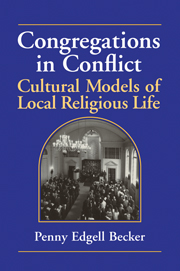Book contents
- Frontmatter
- Contents
- Tables
- Acknowledgments
- 1 “Who We Are” and “How We Do Things Here”: Local Understandings of Mission and Identity
- 2 The Congregations of Oak Park, River Forest, and Forest Park
- 3 Houses of Worship
- 4 Family Congregations
- 5 Community Congregations
- 6 Leader Congregations
- 7 Mixed Congregations
- 8 An Institutional Approach to Local Culture
- 9 American Congregational Religion
- Appendix A Data and Methods
- Appendix B The Interview Questions
- References
- Index
1 - “Who We Are” and “How We Do Things Here”: Local Understandings of Mission and Identity
Published online by Cambridge University Press: 07 August 2009
- Frontmatter
- Contents
- Tables
- Acknowledgments
- 1 “Who We Are” and “How We Do Things Here”: Local Understandings of Mission and Identity
- 2 The Congregations of Oak Park, River Forest, and Forest Park
- 3 Houses of Worship
- 4 Family Congregations
- 5 Community Congregations
- 6 Leader Congregations
- 7 Mixed Congregations
- 8 An Institutional Approach to Local Culture
- 9 American Congregational Religion
- Appendix A Data and Methods
- Appendix B The Interview Questions
- References
- Index
Summary
Martha immediately took me back to her kitchen and fixed me a cup of coffee. It was late August 1991, and I had spent the spring and summer doing research on Oak Park and its two neighboring villages, River Forest and Forest Park. I had been reading both local papers, spending time at the libraries and the historical society office, and I had a list of local restaurants where the managers did not mind if I spent hours when they were not busy, drinking coffee and taking up table space with my notes. The ice cream shop on Chicago Avenue had become a favorite. I had interviewed community leaders and informants, including one reporter on the local paper who grew up in Oak Park and spent most of one summer afternoon in the bagel shop at the center of town, chain-smoking and telling me about the community's history and politics.
I had just begun interviewing members of Martha's church, Hope Episcopal, the first congregation out of twenty-three in which I would conduct interviews. I would find out that many of the people I interviewed preferred talking in the kitchen, and this was particularly true of women like Martha. In her sixties, Martha is a retired widow who has lived in Oak Park for over thirty years. She has been both a homemaker and a professional woman, and for many years an active member and leader in Hope Episcopal Church. She is thin and tall, and her straight dark hair, bobbed short, has a little gray. She is energetic and friendly.
- Type
- Chapter
- Information
- Congregations in ConflictCultural Models of Local Religious Life, pp. 1 - 25Publisher: Cambridge University PressPrint publication year: 1999



